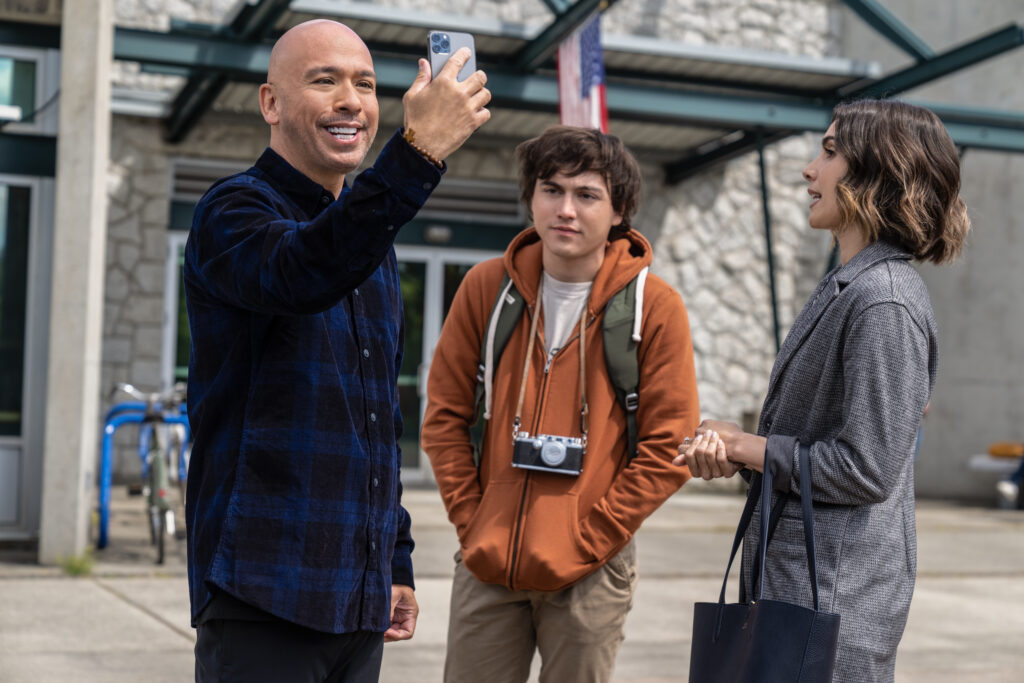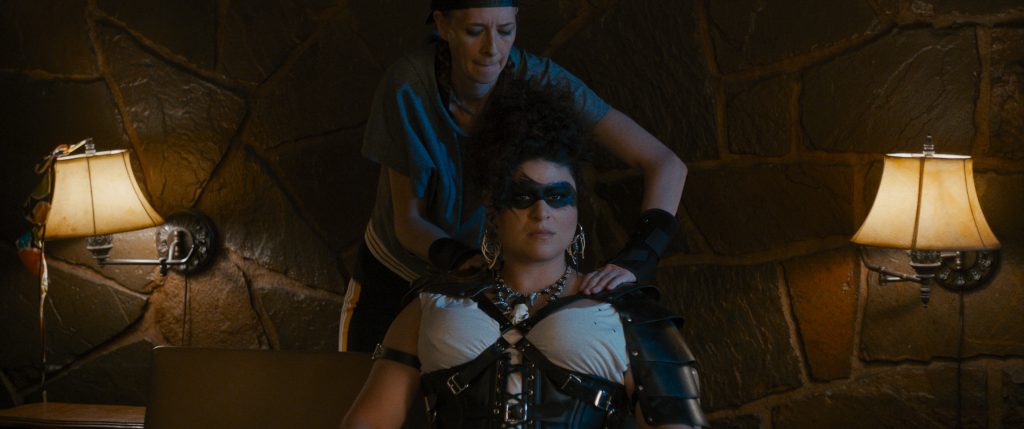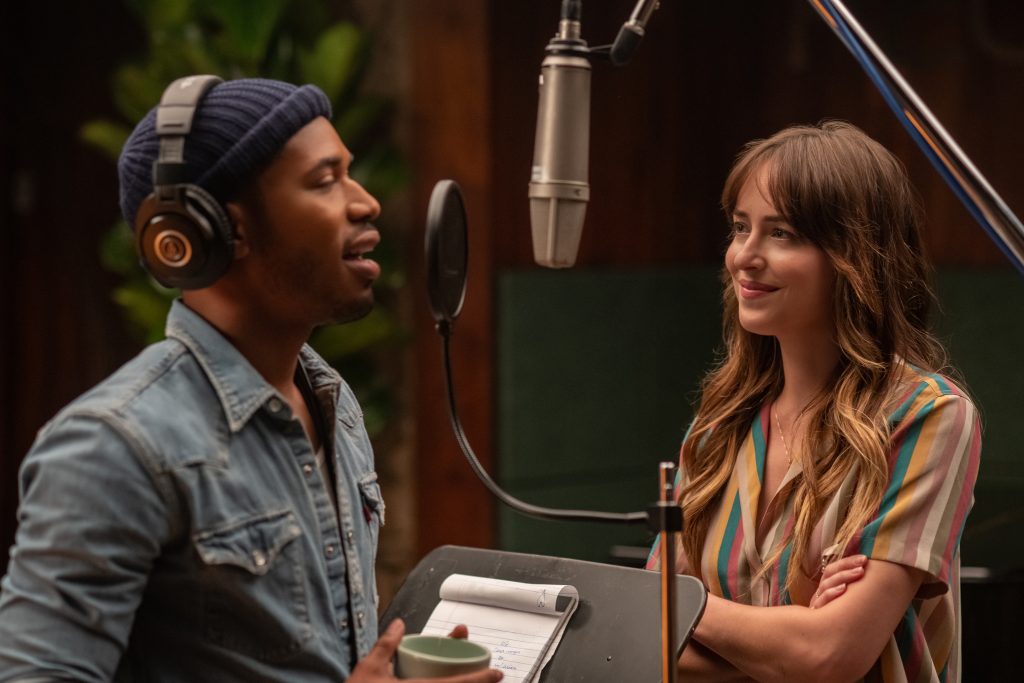August 4, 2022
by Carla Hay

Directed by Jay Chandrasekhar
Some language in Tagalog with no subtitles
Culture Representation: Taking place primarily in California’s Los Angeles County and Daly City, the comedic film “Easter Sunday” features a cast of predominantly Asian characters (with some white people and a few African Americans) representing the working-class and middle-class.
Culture Clash: A struggling, divorced actor in the Los Angeles area is pressured to go to his family’s annual Easter Sunday dinner about 385 miles away in Daly City, on the same day that he might have to be in Los Angeles for an important event that could change his career for the better.
Culture Audience: “Easter Sunday” will appeal primarily to people are are fans of star Jo Koy and any family comedy that wallows in mediocre and predictable stereotypes.

The uninspired comedy “Easter Sunday” is like being served rotten Easter eggs that went stale years ago. It piles on over-used and tired clichés about family reunions, while dumping in a silly subplot about paying a debt to a vengeful criminal. This predictable tripe might have been more appealing if it had just stuck to the family issues. But instead, “Easter Sunday” goes off the rails toward the last third of the movie when it forces a ridiculous and horribly written crime caper into this already weak storyline.
Directed by Jay Chandrasekhar, “Easter Sunday” (which was written by Ken Cheng and Kate Angelo) can certainly be praised for having diversity in the movie’s cast and behind-the-scenes filmmaking team. However, that diversity doesn’t automatically mean that the movie is going to be any good. Unfortunately, “Easter Sunday” missed an opportunity to be a standout comedy film for having a truly original and amusing story. “Easter Sunday” has so many ripoffs and recycled tropes from similar comedy films, it’s embarrassing.
There’s the male protagonist who has a love/hate relationship with certain family members. There’s the big family reunion that’s supposed to cause him a lot of stress. There’s the goofy sidekick who gets the protagonist in all sorts of trouble. And that trouble usually involves cartoonish violence and hard-to-believe scenarios. All of these stereotypes are in “Easter Sunday,” which mostly fails to be funny, charming, bold or interesting.
In “Easter Sunday,” the protagonist is a struggling actor named Joe Valencia (played by Jo Koy), who is on the verge of getting his first big break in years: starring in a TV comedy series. Joe, who lives in Vernon, California (a suburb of Los Angeles), is a divorced father to a son who is about 16 or 17 years old. Joe’s son is also named Joe but is nicknamed Junior (played by Brandon Wardell), who is often estranged from Joe because Joe has a long history of being a flaky parent who avoids spending family time with Junior.
What makes Joe’s unstable parenting even worse is that Junior doesn’t live very far from Joe. Therefore, Joe has no real excuse for why he doesn’t spend time with Junior as much as Joe should. Joe’s ex-wife Catherine (played by Carly Pope), who is remarried, has custody of Junior. Catherine’s current husband Nick (played by Michael Weaver) is a player for the professional ice hockey team the Los Angeles Kings. Nick is good-looking, athletic, and makes a lot more money than Joe does. Nick and Junior also get along with each other.
And you know what that means: Joe is predictably jealous. This jealousy comes out in a scene where Joe makes a rare visit to Catherine and Nick’s home to pick up Junior for a father/son visit. Before they leave, Nick and Joe have a petty argument because Nick insists on making Joe a nutritious smoothie drink. Joe reluctantly takes the smoothie drink but then dumps it out on a street near the house as Joe is driving away. Joe deliberately does it in full view of Catherine and Nick, so that the couple can see Joe make this mess. It’s the first of many signs that Joe can be obnoxious and immature.
Junior is close to being put on academic probation at the private school that he attends, but Joe doesn’t feel equipped to handle this problem. Still, Joe agrees to attend a parent-teacher meeting at the school with Catherine and Junior to discuss this issue. And it should come as no surprise that the meeting is on the same day that Joe has to audition for this sitcom, which is called “Great Scott.”
Joe is being considered for the TV show’s starring role, in which he would be portraying an attorney. Joe’s ambitious and smarmy agent Nick (played by “Easter Sunday” director Chandrasekhar) knows that this audition is the biggest thing that’s come along for Joe in years. This major opportunity leads to Nick putting enormous pressure on Joe to do whatever it takes to get the job.
Joe’s main claim to fame is starring in a beer commercial that aired years ago. In this commercial, he shouted the catch phrase, “Let’s get this party started, baby!” (with “baby” pronounced “baybay”), which became his signature line as an actor. The problem is that Joe has become pigeonholed as that “beer commercial guy,” and people who know he’s an actor always expect him to say that line. (And expect to hear people in “Easter Sunday” say “Let’s get this party started, baby!,” repeatedly, to annoying levels.)
The school meeting is scheduled to take place after the audition. During the audition, Joe’s racial identity becomes a point of discussion that borders on offensive. Just like Koy’s real-life racial identity and family backround, Joe is biracial. His mother is an immigrant from the Philippines, and his father is a white American, who abandoned the family when he was a child. In the audition, Joe is asked to make his voice sound more “half-Filipino.” Joe is insulted because he thinks he should play the role with his natural American accent.
However, the audition runs much longer than Joe expected. And so, Joe misses the parent-teacher meeting. Junior and Catherine are disappointed, but not surprised. Meanwhile, Nick tells Joe in multiple phone calls that Joe will get the role in “Great Scott,” but only if Joe does what the TV network wants for the “half-Filipino accent.” Joe is told to stand by and be available in case there needs to be a follow-up meeting with executives from the TV network.
In the midst of this potential career-changing opportunity, Joe gets a call from his domineering mother Susan (played by Lydia Gaston), who lives in Daly City, a San Francisco suburb that’s about 385 miles north of Los Angeles. Susan insists that Joe and Junior attend their family’s annual Easter Sunday reunion. Joe reluctantly agrees, even though he knows he could be called to have a last-minute meeting with TV executives in Los Angeles. And so, Joe and Junior take a road trip to Daly City.
The other family members attending the reunion are:
- Teresa (played by Tia Carrere), Susan’s sister/Joe’s aunt, who has been feuding with Susan for years for a reason they both can’t remember. Teresa (who is vain and shallow) and Susan (who is cranky and judgmental) are highly competitive with each other to prove who’s the “best” family member.
- Eugene (played by Eugene Cordero), Teresa’s ne’er-do-well son, who is always on the hustle for his next “get rich quick” scheme. Eugene greatly admires his older cousin Joe, who has recently invested $20,000 for Eugene’s new business venture.
- Regina (played by Elena Juatco), Joe’s sensible younger bachelorette sister, who works as a nurse. Regina is slightly envious but happy that Joe got to follow his dreams to become an actor, while she felt pressured by their mother Susan to have a more stable profession.
- Yvonne (played by Melody Butiu) and Manny (played by Joey Guila), Joe’s married aunt and uncle, who can be boisterous and opinionated at family events, but these spouses generally get along with everyone in the family. Yvonne and Manny (who is the brother of Susan and Teresa) try to stay out of the feud between Susan and Teresa.
- Arthur (played by Rodney To), Joe’s eccentric bachelor uncle, who works as a mailman and likes to keep a secret arsenal of weapons hidden in his clothes. (You can bet that this weapons stash will be used for slapstick comedy in the movie.)
Eugene told Joe that Eugune’s new business venture would be a taco truck. But after Eugene took Joe’s money, Eugene changed his mind and decided the truck (which Eugene has named Hypetruck) would sell the latest fad games and toys. Bizarrely, Eugene also wants to sell trendy designer clothes and high-priced athletic shoes from the truck, without thinking that the image-conscious target customers for this type of apparel wouldn’t want to tackily buy these items from a truck. Joe isn’t happy when he finds out about this “bait and switch” scam that Eugene pulled on him.
Joe gets even more irritated when he finds out that Eugene owes $40,000 to a gun-toting shady character named Dev Deluxe (played by Asif Ali), who owns and operates a jewelry store called Jewelry Jamz in a Daly City shopping mall. But the store is just a money-laundering front for Dev’s illegal businesses, which aren’t named in the movie, but viewers can use their imagination. It doesn’t take long for Dev to show up with some of his thugs to threaten Eugene with bodily harm if Eugene doesn’t pay back the money in the short period of time that just happens to be the same period of time that Joe will be in Daly City.
The rest of “Easter Sunday” is an awkward mix of Joe and Eugene trying to come up with the money while attempting to make it to Susan’s home on time for the Easter Sunday dinner. It leads to a not-very-funny subplot of stolen boxing gloves that were worn by Manny Pacquiao; an encounter with actor Lou Diamond Phillips (playing a version of himself); and lots of bickering and nagging from Susan and Teresa.
Junior has taken up photography as a hobby (he has a vintage camera that uses film), which is how he meets his love interest Tala (played by Eva Noblezada), when Junior is taking some photos in a park. After a brief flirtation, Junior (who doesn’t have a lot of experience in dating) and Tala (who is sassily confident and sarcastic) start hanging out together. Junior shyly invites Tala to the Easter Sunday family dinner. It’s just an excuse for Tala to be with this family when some of the dumb shenanigans start happening.
And gee, what a coincidence: Tala works at Jewelry Jamz, the store owned by Dev, Eugene’s angry and violent debtor. “Easter Sunday” also has a clumsily written “coincidence” when Joe, Eugene, Tala and Junior end up in a high-speed car chase. The cop who pulls them over just happens to be Joe’s ex-girlfriend Vanessa Morgan (played by Tiffany Haddish), who is still bitter that the relationship ended because Joe cheated on her. This encounter with Vanessa is in the “Easter Sunday” trailer, and it’s just more of Haddish playing a tacky “angry black woman” stereotype that she keeps doing for most of her on-screen roles.
In the race against time to get the money to pay back Dev, “Easter Sunday” has a subplot about Joe and Eugene enlisting the help of an acquaintance named Marvin (played by Jimmy O. Yang), who sells black-market designer merchandise (mostly athletic shoes) in the back room of a store. Marvin’s role in “Easter Sunday” isn’t nearly as terrible as Vanessa’s role, but it’s still not a very interesting character. Yang is a skilled stand-up comedian whose talent is under-used in this fairly bland role.
“Easter Sunday” wastes some time where Koy, who’s best known as a stand-up comedian, has to have a scene where he does a version of his stand-up act. This inept scene takes place during a church service, where it goes from the priest Father Hildo (played by Rodney Perry) publicly shaming Joe for not donating enough money to the church, to Joe getting in front of the congregation and doing low-rent, stand-up comedy to win over the crowd. Yes, it’s as bad as it sounds.
The movie’s ways of depicting Filipino culture and Filipino American culture are superficial at best and mishandled at worst. There are the expected close-up shots of Filipino food on dining tables, which is something that is very easy to do in a movie. What’s much harder to do, especially in a comedy, is depiciting Filipino cultural pride in an authentic way that doesn’t pander to negative clichés. For example, in the “Easter Sunday” subplot about Manny Pacquiao’s boxing gloves, Joe insists that only someone of Filipino heritage can own the gloves, which is just a phony and cumbersome way to drag out the hijinks related these boxing gloves.
The performances by the “Easter Sunday” cast members range from adequate to over-the-top hammy. Koy’s Joe character is just a formulaic retread of what stand-up comedians usually do when they have a starring role in their first major feature film: They play a character who’s a clownish screw-up in need of redemption and “important life lessons.” Wardell and Noblezada (as would-be couple Junior and Tala) fare the best at having the most naturalistic performances and the best comedic timing. Everyone else is just playing stereotypes.
Expect to see a lot of pouting and preening from Gaston and Carrere as feuding sisters Susan and Teresa. The way this family feud is handled in “Easter Sunday” plays into outdated and sexist perceptions of women as “catty” and “difficult” if they’re obnoxious, but irresponsible men like Joe and Eugene are supposed to be thought of as “funny” and “freewheeling” if they’re obnoxious. Unfortunately, the very talented Phillips is not in “Easter Sunday” as much as people might think he’s in the movie. His “Easter Sunday” screen time is less than 15 minutes.
“Easter Sunday” does make an attempt to have some heartfelt family moments, but they are too often marred by making these family members look very dorky—and not in a good way. There’s an extremely cringeworthy karaoke scene involving the family singing Black Eyed Peas’ over-played 2009 hit “I Gotta Feeling,” as if they’re the coolest family in California. This scene will just make viewers wonder what year this moldy and out-of-touch “Easter Sunday” screenplay was completed.
Sometimes, a movie can have a scene-stealing villain who makes the film more entertaining to watch. “Easter Sunday” doesn’t have this type of villain. Dev is just a complete buffoon who has some of the worst lines in “Easter Sunday.” Dev’s last few scenes in the movie are just a sloppily edited and witless atrocity that looks like the “Easter Sunday” filmmakers ran out of ideas for this foolish character.
At the same time, “Easter Sunday” tries to cram in too many subplots with the Joe character and ends up over-relying on lackluster and predictable ways to try to resolve these subplots. Easter Sunday is a religious holiday about a miracle. This hackneyed “Easter Sunday” movie needed a miracle to make it a throroughly entertaining comedy.
Universal Pictures will release “Easter Sunday” in U.S. cinemas on August 5, 2022.




